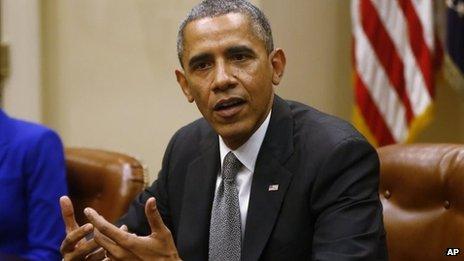Shutdown: Obama would sign short-term debt rise
- Published

Obama met small business owners and heard fears of financial woes due to the shutdown, the White House said
US President Barack Obama is willing to sign a "clean" short-term increase to the US borrowing limit that is free from Republican budget and policy demands, his spokesman has said.
Jay Carney's remarks came amid talks aimed at ending the twin fiscal crises threatening the US and world economies.
The US is in the 11th day of a partial government shutdown.
But the Statue of Liberty, the Grand Canyon and Mount Rushmore, closed by the shutdown, will now re-open.
The funding will be provided by the states of New York, Arizona and South Dakota, however, with other national parks and monuments remaining closed due to the deadlock in Washington.
As the well as the shutdown, the US is heading towards default if it does not raise its debt limit by 17 October.
"If the Congress were to pass a clean debt ceiling of short duration to avoid default, the president would sign that," Mr Carney said, following rounds of talks among Mr Obama and Senate and House Republicans.
But Mr Carney reiterated the White House would not accept a debt ceiling rise with conditions attached, saying the right thing to do was to "remove that gun from the table".
And the White House spokesman said there was still "no acceptable reason to keep the government shut down".
'Not enough'
The partial government shutdown, which has sent home hundreds of thousands of government workers on unpaid leave, began on 1 October after Republicans refused to pass a new budget unless Mr Obama and the Democrats agreed to delay Mr Obama's signature healthcare reform law of 2010 or eliminate its funding.
The White House has repeatedly said it would not undermine the law, known as Obamacare, nor negotiate over larger budget matters, until Republicans vote to end the threat of default and reopen the government.
Mr Carney also condemned a proposal floated by the House Republicans for a six-week debt limit increase in exchange for broader budget negotiations.
He said it would "put us right back where we are today in just six weeks, on the verge of Thanksgiving and the obviously important shopping season leading up to the holidays, and that would create enormous uncertainty for our economy... We don't think that's the right way to go".
The Democratic-controlled Senate is set to vote on Saturday on a 15-month extension of the debt ceiling, which would remove the issue from next year's congressional campaigns.
'Everybody is talking'
Meanwhile, Senate Republicans left a meeting at the White House on Friday which they described as constructive.
Republican Senator Susan Collins said after leaving the White House on Friday that Mr Obama had expressed interest in elements of her plan to fix both crises, but "did not endorse it".
Ms Collins's plan, one of several being considered by Republicans in the Senate, includes a repeal of a tax on medical devices, which was designed to help fund insurance subsidies in Mr Obama's healthcare law.
"He obviously did not agree with my descriptions of the negative impact of the tax," Ms Collins said.
"But he clearly also recognises that it is not the heart of Obamacare in any way, and that as long as the revenue is replaced, as I proposed, that it does not hurt his signature programme."
Other Republicans seemed to share Ms Collins's optimism but did not hint a deal was near.
"Everybody is talking to everybody now, and I'm encouraged by that," Senator Mike Johanns said.
As the shutdown entered its 11th day, Mr Obama met a group of small business owners at the White House who told of financial woes caused by the shutdown.
"They shared stories with the President about contracts cancelled or put on hold, furloughed workers and the potential for shift and staff reductions should the shutdown continue," the White House said in a statement.
On Capitol Hill, industry and government officials told a Senate panel that the shutdown's economic impact would intensify with each passing day.
Marion Blakey, chief executive of the Aerospace Industries Association, told the committee the shutdown had already virtually stopped certification of new aircraft, equipment and training simulators, because the Federal Aviation Administration (FAA) had placed more than 90% of its employees who work on such issues on unpaid leave.
And National Transportation Safety Board chairwoman Deborah Hersman said her agency was no longer sending investigators to accident sites, including a fatal bus crash that killed six people in Tennessee, an oil spill site in North Dakota, and a small aeroplane crash in Arizona that killed four.
Major parks reopen
About 15,000 workers in the private sector have already been laid-off as a result of the shutdown, the labour department has said.
On Friday, it was announced the Statue of Liberty and the Grand Canyon, two world-renowned national parks that had been closed since the government shutdown, are to open soon.
Operation of the parks will be funded by the states of New York and Arizona, respectively.
"We will not allow this international symbol of freedom to remain closed because of the dysfunction and gridlock of Washington," New York Governor Andrew Cuomo, a Democrat, said in a statement, external.
Arizona Governor Jan Brewer, a Republican, said, external: ""I'm gratified the Obama administration agreed to reverse its policy and allow Arizona to reopen Grand Canyon, Arizona's most treasured landmark and a crucial driver of revenue to the state."
A survey suggests the majority of Americans blame the Republicans for the partial shutdown.
A Wall Street Journal/NBC News poll suggests 53% of Americans fault Republicans for the crisis, compared with 31% who say the Democrats are responsible.